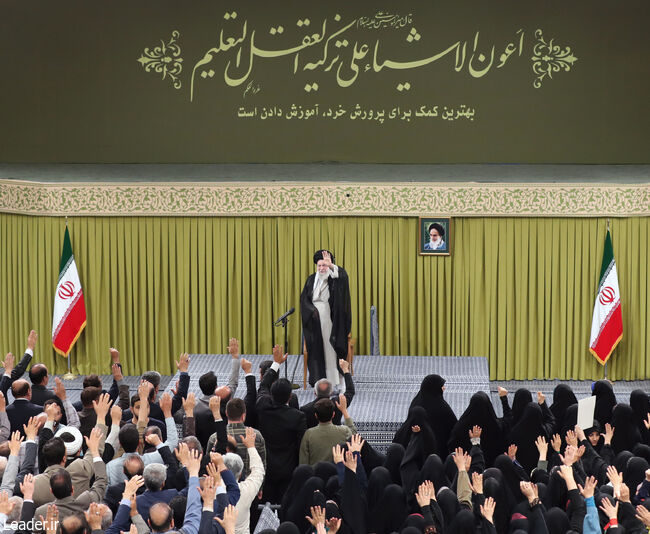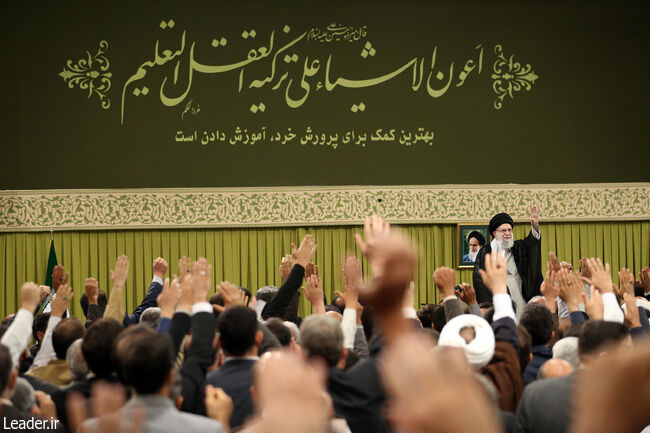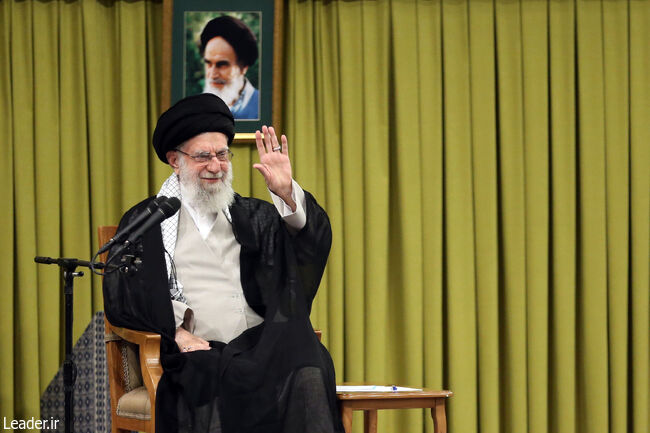The Leader of the Islamic Revolution met this morning with thousands of teachers and educators. He emphasised the necessity of portraying teachers in a positive, lively, and endearing manner in public perception. He stated that achieving this requires artistic and media efforts by the institutions responsible. Additionally, he criticised certain viewpoints that advocate the outsourcing of some educational programming as incorrect. He said, "The new structure of the education system must be designed and transformed in such a way that it cultivates a generation of knowledgeable, faithful, patriotic, hardworking individuals who are hopeful about the future."
In reference to recent remarks by the U.S. president, Ayatollah Khamenei denounced his claim of 'establishing peace through power' as a lie. Pointing to the U.S. administration's attempt to impose a model on Arab countries, one that requires ongoing dependence on America, he added, "This model is certainly doomed to fail, and with the resolve of the nations of the region, both America will be expelled from the region, and the cancerous tumour of the Zionist regime, which fuels corruption, war, and division, will be eradicated." He further emphasised, "The Islamic Republic will continue to grow in power and, to the dismay of its enemies, will achieve progress many times over."
At the outset of his remarks, Ayatollah Khamenei stated that the purpose of this meeting was to express gratitude to teachers and honour the teaching profession. He emphasised that any expenditure on education is, in fact, an investment in the nation's future, adding, "Fortunately, the honourable President has expressed particular concern for educational issues, and the honourable Minister is also an outstanding administrator, well-acquainted with the affairs of this institution."
He stated that realising good objectives and ideas depends on their diligent pursuit, and then proceeded to make several points about teachers. The Leader of the Revolution emphasised that honouring teachers, whether through financial support or by creating an innovative, beautiful, cheerful, and endearing image of them in the public mind, is an important responsibility. He said, "The outcome of honouring teachers and portraying them in this way should be a society that views educators as attractive, dynamic, hardworking, and dignified individuals - ultimately elevating the teaching profession to the top of young people's preferred career choices."
He said creating such an image of teachers requires media and artistic efforts, such as producing storybooks, films, and animations. He said, "These tasks fall to promotional institutions like state broadcasting and the Ministry of Culture, though the Ministry of Education must actively pursue it."
In another remark, the Leader of the Revolution emphasised the importance of having a correct understanding of the significance of the educational work and efforts that teachers make. He said, "A teacher is not merely a transmitter of textbook knowledge, but rather their ethics, conduct, classroom presence, the quality of their teaching, and their personal traits, such as humility or arrogance, enthusiasm or dejection, all play a formative role in shaping the student's character. These all shape the character of the student and may influence them even more deeply than their parents. When a teacher enters the classroom with this awareness, they will exercise exceptional care in their words and actions."
In another important remark, Ayatollah Khamenei emphasised the significance of Farhangian University and teacher training centres, stating, "This university belongs to the Ministry of Education, and certain suggestions regarding transferring its affiliation to other institutions are not in the country's best interest."
Referring to the admission criteria established during the tenure of Martyr Raisi for admissions to this university, he stressed, "Do not allow those standards to be weakened, for the quality of this university must be such that it can truly produce the kind of exemplary and competent teachers the country needs."
In another part of his speech, the Leader of the Revolution addressed several key points about the education system. In his first point, Ayatollah Khamenei affirmed that education is a governmental institution affiliated with the state and stated that it is the duty of an Islamic government to enhance the academic, technical, vocational, and spiritual development of students. He added, "Sometimes murmurs are heard here and there—even within the ministry itself—about outsourcing certain parts of the education system." The Leader said that this amounts to a kind of feudalism and is wholly untenable.
He spoke about his firm opposition to the requests of certain former senior officials who had proposed such a move, citing the high costs of education as an excuse. He said, "The intellectual and cultural upbringing of the new generation is both the duty and the right of the state. The education system belongs to the state, and while being accountable for fulfilling this responsibility, the state should take pride in investing in education and advancing the educational system."
Ayatollah Khamenei described the involvement of millions of girls and boys aged 6 to 18 in the Ministry of Education as an unparalleled opportunity. Posing the critical question that, if this vast population is not properly nurtured, what answer will we have before God and future generations, he transitioned to his second point: reforming the structure of the Ministry of Education.
He emphasised that the structure of the Ministry of Education must be oriented toward the scientific, cultural, and religious development of students, saying that the current structure is ineffective in fulfilling this purpose. He said, "One of the government's duties in the Seventh Development Plan is to design a new organisational structure for the Ministry of Education. The task must be pursued with a transformative approach, tailored to needs, and executed to the highest standard."
The Leader of the Revolution considered it essential to revise the Education Transformation Document and prevent any stagnation in the implementation of the roadmap for this initiative, which was launched during the late President Raeisi's tenure. He said, "Those responsible for designing the new structure of the Ministry of Education must be both technically skilled and have experience within the system. They should be deeply familiar with how it works and firmly committed to religion and the country's independence. Only then can this new framework cultivate a generation of knowledgeable, faithful, patriotic youth who are hardworking, resilient, and hopeful for the future."
While acknowledging the importance of textbooks and his prior recommendations, Ayatollah Khamenei stated that including content such as the names of Islamic scholars or excerpts from the "Den of Espionage" documents (referring to the former U.S. Embassy in Tehran) in textbooks is necessary but insufficient. He said, "Textbooks must be rich and appealing in content, such that even complex scientific topics are conveyed to students in simple and engaging language. Their layout and visual design should also align with aesthetic principles, something which, at present, is not the case."
He emphasised, "The institution and individuals responsible for compiling textbooks must be fully grounded in religious and political faith, and possess a firm commitment to the principles, foundations, and values of Islam and the Revolution."
The Leader of the Revolution emphasised the necessity of expanding vocational and technical training centres, which enable skilled youth to enter the job market earlier and help prevent youth unemployment. In another key point regarding educational priorities, he stated, "The issue of educational equity, which national officials have heavily emphasised in their statements, has always been a priority. However, educational equity does not mean neglecting exceptional talent. Supporting initiatives like SAMPAD (National Organisation for Development of Exceptional Talents) and enabling gifted youth to make greater leaps forward is not contrary to equity. It is, in fact, the very essence of educational justice."
In his final remarks on education-related issues, Ayatollah Khamenei referred to past negligence toward the Training Division and its elimination based on misguided reasoning. He added, "Fortunately, there is now considerable attention being given to matters regarding guidance and efforts in this domain must be pursued and executed to the highest standard." In the final part of his remarks, he referred to the statements made by the President of the United States during his recent trip to the region. He said, "Some of the remarks made by the U.S. President during this trip were so shallow and embarrassing, both for the speaker himself and for the American people, that they are not even worthy of a response."
The Leader of the Revolution called part of Trump's remarks, his claim that he wants to use power for peace, a lie, and added, "When has he or any U.S. government ever used power for peace? They have used power to massacre people in Gaza, to ignite wars wherever possible, and to support their own mercenaries."
Ayatollah Khamenei acknowledged that power can be used for peace and security, stating, "It is precisely why the Islamic Republic, much to the dismay of its enemies, will continue to increase its own power and the country's strength day by day. But they, on the other hand, used their power to give 10-ton bombs to the Zionist regime to drop on the heads of children in Gaza, on hospitals, homes, and wherever else they can, in Lebanon or anywhere else."
He referred to previous remarks by the U.S. President, who had claimed that countries in the region could not survive even ten days without America. He stated, "In his current dealings and proposals, he seeks to impose this very model on them—a model that has undoubtedly failed. Through the resolve of the nations of the area, America must and will be expelled from this region."
The Leader of the Revolution described the Zionist regime as a source of corruption, war, and strife in the region. He said, "The Zionist regime, which is a cancerous, dangerous, and deadly tumour, must certainly be uprooted from this region, and it will indeed be uprooted."
Ayatollah Khamenei described the principles and value system of the Islamic Republic, which form the foundation of its course of action in this turbulent region, as clear and well-defined. He asserted, "Today's Iran bears no comparison to its past. By divine grace, to the despair of its enemies, and contrary to their wishes, our beloved Iran has progressed. And from now on, our youth will witness how, through their own efforts, the nation will advance several times beyond this."
At the beginning of the meeting, the Minister of Education presented a report outlining the planning and priorities for implementing the Ministry's Fundamental Transformation Document.
The key points of Mr. Alireza Kazemi's report in this meeting included: the special support the President is giving to the Ministry of Education for transformational programs and reducing educational inequality; redesigning curricula with increased focus on skill-based training and addressing the current needs of society; quality improvement of public schools; enhancing the academic and infrastructural standards of teacher training centres; securing authorisation for hiring 85,000 new employees; expanding access to SAMPAD (gifted) schools in underprivileged areas; and emphasising the unique role of schools as the primary hub for preventing social harm.



